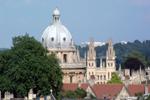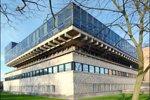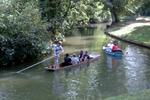Summer School on Cold Atoms and Optical Lattices
| Extended title: | Direct Quantum Simulation of Condensed Matter Physics with cold atoms and molecules |
| Place: | University of Oxford, UK |
| Accommodation: | St Anne’s College, Oxford |
| Dates: | Sept 22-26, 2008 |
| Purpose: | Training 65 graduate students (both theory and experimental) |
| Organiser: | Prof. Christopher Foot |
| Co-directors: | Profs. Ian Walmsley (Oxford), Mark Fromhold (Nottingham) and Mike Gunn (Birmingham). |
| Picture of Participants |
Speakers: (Online material uploaded after lectures.)
| Andrew Daley, Innsbruck | Study of 1D dynamics, and theory of atoms in optical lattices |
| Jean Dalibard, ENS, Paris | Studying 2D physics with cold atoms |
| Simon Fölling, Harvard | Optical lattices with one, two, or many atoms |
| Michael Köhl, Cambridge | Experiments on fermions in optical lattices |
| Dieter Jaksch, Oxford | Theory of cold atoms in optical lattices |
| Chris Hooley, St Andrews | Cold atoms in optical lattices from a CMP perspective |
| Peter Kruger, Nottingham | Atom chips |
| Mike Gunn, Birmingham | FQHE |
| Mark Fromhold, Nottingham | Quantum reflection of cold atoms from surfaces |
| Roderich Moessner, Oxford | Lattice models for quantum magnetism and correlated electrons |
| Leonardo Fallani, Florence | Ultracold bosons in disordered potentials |
| Christopher Foot, Oxford | Optical Lattices: some experimental techniques |
 |
 |
 |
Scientific Objective:
The quantum systems of ultra-cold atoms, in particular atoms in optical
lattices, have strong similarities to the strongly correlated many-body systems
that are central to Condensed Matter Physics. This close connection has
stimulated great interest because we can use optical-lattice experiments to
study the behaviour of many-body quantum systems under very controlled
conditions and hence gain a deeper understanding of the physics in ways that are
not otherwise possible.
The summer school will introduce students to the progress that has been made
towards this goal in experiments and give them a good grounding in the
underlying theory. There will be problems classes on work set by lecturers and
plenty of opportunities for discussion. Students can present work at poster
sessions, if desired, although it is expected that a significant number of
participants will be at a very early stage in their research career.
Cost of per student (full board Sunday pm to Saturday am):
660 Euro or 480 GBP.
Note however that bursaries to cover half the costs, or more in some cases,
should be available for the majority of students.** Students are expected to
make their own travel arrangements.
Applications received before May 16th, 2008 will be given highest priority for
places and bursaries.
Email: susan.gardner@physics.ox.ac.uk
** Financial support for the Summer School has been provided by:
European Science Foundation through the EuroQUAM programme.
European Union through the QUPEST early stage training scheme.
EPSRC through Science and Innovation grants to a) Cambridge, Imperial College &
Oxford, and b) Birmingham & Nottingham.
Eligibility: EU nationals (inc. UK!). People working or studying at a university
or research institute in the EU. Others to be decided, depending on funds
available.
